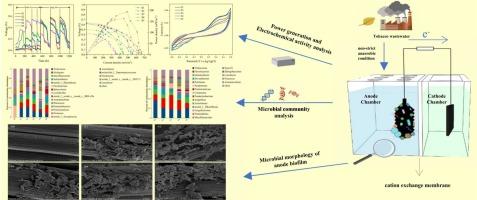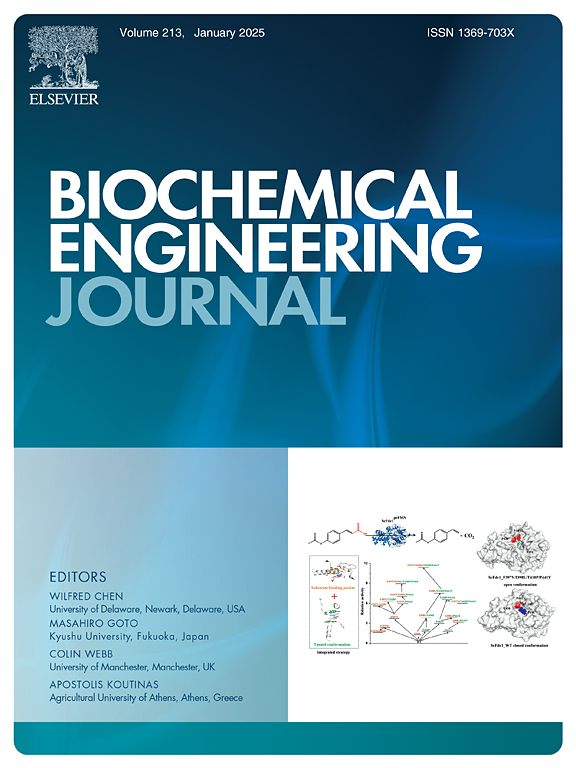Microbial community analysis in microbial fuel cell under non-strict anaerobic condition: synchronous generation of power and tobacco wastewater treatment
IF 3.7
3区 生物学
Q2 BIOTECHNOLOGY & APPLIED MICROBIOLOGY
引用次数: 0
Abstract
Tobacco wastewater poses a significant environmental threat due to its toxic constituents, which are difficult to remove using conventional treatment methods. Microbial fuel cells (MFCs) are promising devices harnessing the catabolic activity of microorganisms to produce electricity with wastewater treatment. In this study, MFCs were constructed to evaluate the performance of tobacco wastewater treatment and electrical energy generation under mildly anaerobic conditions. The MFCs supplied with various additional carbon sources (e.g., acetate, glucose, propionate, and butyrate) exhibited different acclimation capacities for tobacco wastewater treatment. The maximum voltage output of 0.58 V and power density of 193.60 mW/m2 were obtained, along with COD removal of 73.4 ± 2.93 %. The microbial community compositions revealed that Trichococcus was highly abundant in the anodic biofilm enrichment stage (7.46 %-21.07 %) and the wastewater treatment stage (16.22 %-36.55 %), which may play an important role in the electrical energy generation. This study firstly demonstrates that MFC is an effective and environmentally friendly technology for tobacco wastewater treatment and electrical energy generation under non-strict anaerobic condition.

非严格厌氧条件下微生物燃料电池微生物群落分析:同步发电与烟草废水处理
烟草废水因其有毒成分而对环境构成重大威胁,而传统处理方法难以去除这些有毒成分。微生物燃料电池(mfc)是一种很有前途的装置,它利用微生物的分解代谢活性,通过废水处理来发电。在本研究中,构建了MFCs,以评估在轻度厌氧条件下烟草废水处理和发电的性能。不同碳源(如醋酸盐、葡萄糖、丙酸盐和丁酸盐)对烟草废水处理的驯化能力不同。最大输出电压为0.58 V,功率密度为193.60 mW/m2, COD去除率为73.4 ± 2.93 %。微生物群落组成表明,毛球菌在阳极生物膜富集阶段(7.46 %-21.07 %)和废水处理阶段(16.22 %-36.55 %)中含量较高,可能在发电过程中发挥重要作用。本研究首先证明了MFC是一种在非严格厌氧条件下有效且环保的烟草废水处理和发电技术。
本文章由计算机程序翻译,如有差异,请以英文原文为准。
求助全文
约1分钟内获得全文
求助全文
来源期刊

Biochemical Engineering Journal
工程技术-工程:化工
CiteScore
7.10
自引率
5.10%
发文量
380
审稿时长
34 days
期刊介绍:
The Biochemical Engineering Journal aims to promote progress in the crucial chemical engineering aspects of the development of biological processes associated with everything from raw materials preparation to product recovery relevant to industries as diverse as medical/healthcare, industrial biotechnology, and environmental biotechnology.
The Journal welcomes full length original research papers, short communications, and review papers* in the following research fields:
Biocatalysis (enzyme or microbial) and biotransformations, including immobilized biocatalyst preparation and kinetics
Biosensors and Biodevices including biofabrication and novel fuel cell development
Bioseparations including scale-up and protein refolding/renaturation
Environmental Bioengineering including bioconversion, bioremediation, and microbial fuel cells
Bioreactor Systems including characterization, optimization and scale-up
Bioresources and Biorefinery Engineering including biomass conversion, biofuels, bioenergy, and optimization
Industrial Biotechnology including specialty chemicals, platform chemicals and neutraceuticals
Biomaterials and Tissue Engineering including bioartificial organs, cell encapsulation, and controlled release
Cell Culture Engineering (plant, animal or insect cells) including viral vectors, monoclonal antibodies, recombinant proteins, vaccines, and secondary metabolites
Cell Therapies and Stem Cells including pluripotent, mesenchymal and hematopoietic stem cells; immunotherapies; tissue-specific differentiation; and cryopreservation
Metabolic Engineering, Systems and Synthetic Biology including OMICS, bioinformatics, in silico biology, and metabolic flux analysis
Protein Engineering including enzyme engineering and directed evolution.
 求助内容:
求助内容: 应助结果提醒方式:
应助结果提醒方式:


